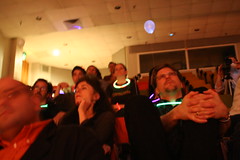Digital Art Beyond Expression
José Manuel García-Patos, who is at work on the interactive fiction system Gesaku, called my attention to a fascinating article about player freedom by Stephen Bond, author of Ramses.
Bond points out that the camp that expects IF to provide a more or less completely blank slate upon which the player’s experience can be realized (so that IF becomes simply a “a text-based vibrator for the imagination”) is quite distant from those who expect IF authors to supply treasures, dragons, puzzles, and conventional pleasures. He offers a third idea, that of “interactive fiction as a kind of art form,” allowing expression. In Bond’s view, artmaking is “egotistical” and “[a]n artwork is a reification of the artist’s self, a subjective consciousness made objective, bravely put forth and held out for admiration.”
The ideas of pure player choice may be as uninteresting as the cave-crawl, but I don’t think this concept of art is the only alternative.


 This post, like the
This post, like the  With our efforts to build interactive drama and comedy, we want to reach a large audience — both as a business opportunity, so we can make our work self-sustaining, and as artists, hoping to reach out and communicate to many. We’re particularly excited about making entertainment that appeals to all those who don’t consider today’s videogames much fun. Let’s call them “non-gamers”. I think non-gamers outnumber gamers, perhaps greatly. For entertainment media, non-gamers enjoy TV, movies, books, even a bit of web, blog and YouTube surfing. We want to add interactive drama and comedy to their list. Reaching them would also have the nice side effect of expanding the expressiveness of videogames as an art/entertainment form.
With our efforts to build interactive drama and comedy, we want to reach a large audience — both as a business opportunity, so we can make our work self-sustaining, and as artists, hoping to reach out and communicate to many. We’re particularly excited about making entertainment that appeals to all those who don’t consider today’s videogames much fun. Let’s call them “non-gamers”. I think non-gamers outnumber gamers, perhaps greatly. For entertainment media, non-gamers enjoy TV, movies, books, even a bit of web, blog and YouTube surfing. We want to add interactive drama and comedy to their list. Reaching them would also have the nice side effect of expanding the expressiveness of videogames as an art/entertainment form.
 In this post I’ll make a case for natural language understanding interfaces in interactive drama and comedy. This is Part 3 of what’s becoming an intermittent developer-diary series about design and technology issues in play as we develop
In this post I’ll make a case for natural language understanding interfaces in interactive drama and comedy. This is Part 3 of what’s becoming an intermittent developer-diary series about design and technology issues in play as we develop 
